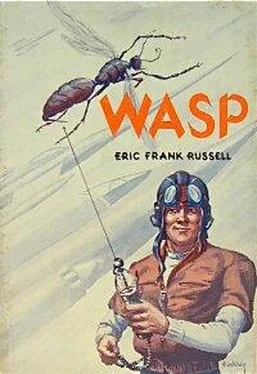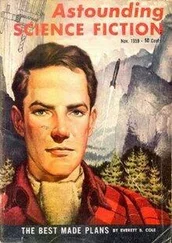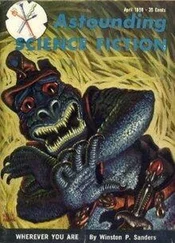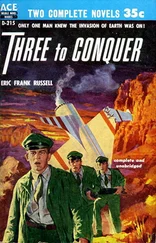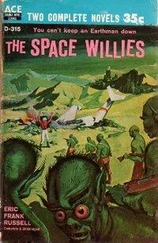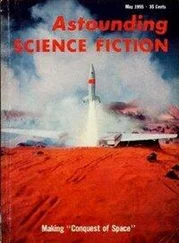Eric Russell - Wasp
Здесь есть возможность читать онлайн «Eric Russell - Wasp» весь текст электронной книги совершенно бесплатно (целиком полную версию без сокращений). В некоторых случаях можно слушать аудио, скачать через торрент в формате fb2 и присутствует краткое содержание. Год выпуска: 1957, Издательство: Avalon Books, Жанр: Фантастика и фэнтези, на английском языке. Описание произведения, (предисловие) а так же отзывы посетителей доступны на портале библиотеки ЛибКат.
- Название:Wasp
- Автор:
- Издательство:Avalon Books
- Жанр:
- Год:1957
- ISBN:нет данных
- Рейтинг книги:3 / 5. Голосов: 1
-
Избранное:Добавить в избранное
- Отзывы:
-
Ваша оценка:
- 60
- 1
- 2
- 3
- 4
- 5
Wasp: краткое содержание, описание и аннотация
Предлагаем к чтению аннотацию, описание, краткое содержание или предисловие (зависит от того, что написал сам автор книги «Wasp»). Если вы не нашли необходимую информацию о книге — напишите в комментариях, мы постараемся отыскать её.
British spelling.
Wasp — читать онлайн бесплатно полную книгу (весь текст) целиком
Ниже представлен текст книги, разбитый по страницам. Система сохранения места последней прочитанной страницы, позволяет с удобством читать онлайн бесплатно книгу «Wasp», без необходимости каждый раз заново искать на чём Вы остановились. Поставьте закладку, и сможете в любой момент перейти на страницу, на которой закончили чтение.
Интервал:
Закладка:
“Yar? What is his name?”
Or, “I have a corrected cargo manifest to deliver to the Su-limane.”
“Yar? Let me see it. What’s the matter-can’t you find it? How can you deliver it if you haven’t got it? If it’s not in your pockets it may be in that bag. Why don’t you look in the bag? You afraid to open it, hi?”
Leaving the dockside he walked past the end of the huge shed which stretched the entire length of the dock. Its sliding doors stood three feet ajar. He went through without hesitation. The side farthest from the dock was stacked roof-high with packing-cases of every conceivable shape and size. The opposite side was part full. Near the main quayside doors halfway up the shed stood an array of cardboard cartons and bulging sacks which workers were taking out to the Su-cattra.
Seeing the name Melami stencilled all over the nearest stack of cargo, Mowry looked swiftly toward the distant loaders, assured himself that he had not been observed, dodged behind a big crate. Though no longer visible from inside the shed he could easily be seen by anyone passing the sliding doors through which he had entered. Holding his case endwise ahead of him, he inched through the narrow gap between two more crates, climbed over a big coffin-shaped box, squirmed into a dark alcove between the stack and the shed’s outer wall.
It was far from comfortable here. He could not sit, neither could he stand erect. He had to remain half-bent until, tired of that, he knelt on his case. But at least he was safe. The Melami was held up and nobody was likely to heave its cargo around for the fun of it. He stayed there for what seemed a full day. The time came when whistles blew and sounds of outside activity ceased. Through the shed’s wall sounded a muffled tramp of many feet as workers left for home. Nobody had bothered to close the shed’s doors and he couldn’t make up his mind whether that was a good thing or not. Locked doors would suggest an abandoned dockside guarded by none save the cop on the gate. Open doors implied the arrival of a night-shift or per-haps the protection of roving patrols.
Edging out of the alcove he sat on a crate and rubbed his aching knee-caps: He waited two more hours to let overtime workers and other eager beavers get clear. When his patience ran out he walked through the deserted shed, stopped behind its quayside doors that were directly opposite the middle of the Su-cattra.
From the case he took a limpet-mine, set its timing-switch to give a twenty-hour delay, threaded a length of thin cord through the holding loop. He peeped out the door. There was not a soul on the dockside but a few sailors were busy on the ship’s top deck.
Boldly he stepped out of the shed, crossed the intervening ten yards and dropped the mine into the narrow stretch of water between ship and dockside. It hit with a dull plop and a slight splash, sank rapidly to the limit of its cord. It was now about eight feet below the surface and did not immediately take hold. He waggled the cord to turn the magnetic, face toward the ship. The mine promptly attached itself with a clang loud enough to resound all over the big vessel. Quickly he let go one end of the cord, pulled on the other and reeled it in through the holding-loop.
High above him a sailor came to the deckrail, leaned on it and looked down. By that time Mowry had his back toward him and was strolling casually toward the shed: The sailor watched him go inside, glanced at the stars, spat in the water and went back to his chore.
Soon afterward he repeated the performance with the Su-limane, sticking the mine amidships and eight feet down That one also had a twenty-hour delay. Again the clang aroused careless attention, bringing three curious sailors to the side. But they took their time about it, saw nobody, shrugged it off and forgot it.
Mowry made for the exit gates. On the way he passed two officers returning to their ship. Engrossed in conversation, they did not so much as glance at him. If only they’d known of the long swim in store, he thought, they’d willingly have beaten out his brains.
A different policeman was on duty by the gates as he went through.
“Live long!”
“Live long!” echoed the cop, and turned his attention elsewhere.
Trudging a long way down the road and rounding the corner near to the gates of dock three, Mowry saw the car-park and came to a halt. A hundred yards away his car was standing exactly where he had left it but had become the subject of unwelcome interest. Its hood was raised and a couple of uniformed police were prying around the exposed dynomotor.
They must have unlocked the car with a master-key in order to operate the hood’s release-catch. To go to that length meant they were not amusing themselves by being officious. They were on a definite trail.
Retreating behind the corner, Mowry gave swift thought to the matter. Obviously those cops were looking for the dynomotor’s serial number. In another minute one of them would be crawling under the car to check the chassis number. This suggested that at last authority had realised that Sagramatholou’s car. had changed its plates. So the order had gone out to inspect all cars of that particular date and type.
Right in front of him, hidden from the car-park, stood the unoccupied cruizer belonging to those nosey-pokes. They must have left it there intending to edge it forward a few feet and use it as a watching-post if necessary. Once they’d satisfied themselves that the suspected dyno was indeed a hot one, they’d come back on the run to set a stakeout.
Cautiously he took a peep around the corner. One was talking excitedly while the other scribbled in a notebook. It would be another minute before they returned because they would close the hood and relock the dyno in order to bait the trap.
Certain that no passer-by would question something done with casual confidence, he tried the cruizer’s door-handle. It was locked. He had no key with which to open it, no time to pick it, and that put an end to any thought of taking one car in lieu of the other. Opening his case, he took out the spare limpet-mine, set it for a one-hour delay. He lay in the road, rapidly inched himself under the cruizer and stuck the bomb to the centre of its steel framework. Wriggling out, he brushed himself down with his hands. Seven people had seen him go under and emerge. Not one viewed his actions as extraordinary.
He snatched up his case and departed at a pace that was little short of a shambling run. At the next corner he looked back. One cop was now sitting in the cruizer and using its short-wave radio: The other was out of sight, presumably concealed where he could watch the dyno. Evidently they were transmitting the news that the missing car had been found and were summoning help to surround it.
Yet again adverse circumstances were chivvying him into a tight corner. He had lost the car on which he had relied so much and which had stood him in such good stead. All that he now possessed were his gun, a set of false documents, a large wad of counterfeit money and a case that was empty save for what was wired to its lock. The case he got rid of by placing it in the entrance to the main post-office. That action would not help to cool things down. Discovery of his dyno had warned Alapertane that Sagiamatholou’s killer was somewhere within its bounds. While they were squatting around it in readiness to snare him a police cruizer would shower itself all over the scene. Then somebody would dutifully take a lost case to the nearest precinct station, a cop would try key it open and make an awful mess of the place.
Alapertane already was half-awake. Two big bangs were going to bring it fully awake and on its toes. Somehow he’d have to get out before they copied the Pertane tactic and ringed the town with troops.
Читать дальшеИнтервал:
Закладка:
Похожие книги на «Wasp»
Представляем Вашему вниманию похожие книги на «Wasp» списком для выбора. Мы отобрали схожую по названию и смыслу литературу в надежде предоставить читателям больше вариантов отыскать новые, интересные, ещё непрочитанные произведения.
Обсуждение, отзывы о книге «Wasp» и просто собственные мнения читателей. Оставьте ваши комментарии, напишите, что Вы думаете о произведении, его смысле или главных героях. Укажите что конкретно понравилось, а что нет, и почему Вы так считаете.
